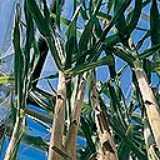|
-
Several business opportunities - component parts of the Integrated Developing Scheme described in Africans, Stop Being Poor! are listed in following table.
| a-
SHEA BUTTER (5,
6, 7,
11, 12,
13)
b- BLUE GOLD (14,
15, 16,
17, 18,
19)
c- FREEZE-DRIED PAPAIN (20,
21, 22
and here)
d-
KENAF (23,
24)
e- VEGETABLE OIL (25,
26, 27,
28)
f- CEREALS (30,
31, 32,
33)
g- FRUITS (34,
35, 36,
37, 38,
39, 40,
42, 43,
44, 45,
46)
h- ESSENTIAL OILS (47,
48, 49,
50, 51,
52)
i- ROOTS & TUBERS (54,
55, 56,
57, 58,
59, 60,
61, 62,
63, 64)
j-
FOWL BREEDING (66,
67, 68,
69, 70,
71, 72, 73, 74, 75, 76)
k- FISH FARMING (78, 79, 80, 81, 82, 83, 84, 85, 86, 87)
l- BIOMASS ENERGY (89, 90, 91, 92)
m- SUGAR CANE & PRODUCTS (93, 94, |
|
-
SUGAR CANE & PRODUCTS: PART
I - SUGAR-CANE AS AN ECONOMIC CATALYST TO DEVELOPING IN AFRICAN COUNTRIES
With the current delivery starts a new series of business opportunities related
to sugar-cane and by-products originating from the industrial processing of
sugar-cane.
 Sugarcane
(image at the left side of this paragraph) is a grass originally from tropical
Southeast Asia (Hortus Third). The thick stalk stores energy as sucrose
in the sap. Sugarcane
(image at the left side of this paragraph) is a grass originally from tropical
Southeast Asia (Hortus Third). The thick stalk stores energy as sucrose
in the sap.
When sugar-cane sticks (see image below this paragraph, at the right side)
are crushed, they release a sweet and sticky juice from which sugar is extracted
by evaporating the water. Crystallized sugar was reported 2500 years ago in
India. Around the eighth century A.D., Arabs introduced sugar to the Mediterranean
and it was cultivated in Spain. It was among the early crops brought to the
Americas by Spaniards. [Source]
 In
fact, this series about sugar-cane is a continuation to the previous one dedicated
to biomass as sugar-cane is a super-biomass raw material and fits well with
the definition of biomass given in previous deliveries [(89, 90, 91, 92,]
but in addition to being a source for energy, sugar-cane, when processed, generates
a string of high value-added products:
Cane-sugar, cane syrup, molasses, bagasse, wax. In
fact, this series about sugar-cane is a continuation to the previous one dedicated
to biomass as sugar-cane is a super-biomass raw material and fits well with
the definition of biomass given in previous deliveries [(89, 90, 91, 92,]
but in addition to being a source for energy, sugar-cane, when processed, generates
a string of high value-added products:
Cane-sugar, cane syrup, molasses, bagasse, wax.
Cane-sugar, cane-sugar fresh juice and rum are the most known sugar-cane's products
to the mainstream consumers in the developing world, but the other above listed
and several others not listed yet are industrial products, which sell in huge
volumes to industrialists in the developed countries.
For
instance, molasses
is used as it is as sweetener; as raw material to producing industrial alcohol,
for explosives, synthetic rubber, and in combustion engines. The ground
and dried cane (after juice has been expressed) makes an excellent
mulch called bagasse that can be baled and shipped economically, because
of its light weight. Bagasse is pure cellulose material, which is an excellent
raw material to producing paper and other products such as cardboard.
It can also be used as fuel source.
Cane-sugar is also used in innumerable recipes around the
world. It is a natural preservative for fruits and meat. Sugar is a common adjunct
to unpleasant medicines. The reeds of sugar cane are made into pens, mats, screens,
and thatch.
It is possible to promote the production of biopharmaceuticals
and other nutriceucals based on sugar-cane and related processed products
as they have been used for ages as medicinal products by folks in Asia, Americas
and Africa. The curing potentialities are endless. It had been reported to be
antidote, antiseptic, antivinous, bactericide, cardiotonic, demulcent, diuretic,
intoxicant, laxative, pectoral, pesticide, refrigerant, and stomachic. It is
a folk remedy for arthritis, bedsores, boils, cancer, colds, cough, diarrhea,
dysentery, eyes, fever, hiccups, inflammation, laryngitis, opacity, penis, skin,
sores, sore throat, spleen, tumors, and wounds (Duke
and Wain, 1981).
One sees, referring to the multitude of by-products originating
from sugar-cane processing into cane-sugar, and the several usages related to
these products that the cultivation of sugar-cane would be a tremendous and high
profit yielding Economic
Catalyst Operation to be integrated into the Developing
Strategy for African Countries as here exposed.
- CANE-SUGAR MARKET'S
CHARACTERISTICS
Sugar market is a peculiar
one that do not obey the trading law of supply / demand. The main characteristics
and peculiarities of the market read as follow:
1- Sugar (cane-sugar
or beet-sugar) production is heavily subsidized all around the world.
2- Nearly forty percent of the world’s sugar is produced by the European
Union, India and Brazil, with Brazil leading the way .
3- Paradoxically, Europe is the world's biggest exporter of sugar because of
subsidies. This lowers world market prices and makes things even harder for more
efficient Third World producers. Many southern countries, organizations and NGOs
have publicly denounced what they see as unfair international trade rules which
favor the rich.
4- There is no genuine world market for sugar. In fact, 80% of the sugar produced
around the globe is never traded on an open market—it is consumed in the
protected markets where it’s produced. The remaining 20% winds up on a world
dump market where huge government subsidies help foreign producers sell surplus
sugar at a fraction of the cost of production. For
more on Sugar Dump Market, click here |
- SUGAR DEFINITION.
BEET-SUGAR VERSUS CANE-SUGAR - REFINED AND BROWN SUGAR
In
non-scientific use, the term "sugar" means sucrose (also
called "table sugar" or saccharose — a
white crystalline solid disaccharide.
Humans most commonly use sucrose as their sugar of choice for
altering the flavor and properties (such as mouthfeel, preservation,
and texture) of beverages and food.
Commercially-produced table sugar
comes either from sugar-cane or from sugar-beet, which can contain sugar
to the proportion of 12 percent to 20 percent of the plant dried weight.
Some minor commercial sugar crops include the date palm (Phoenix
dactylifera), sorghum (Sorghum vulgare) [30, 31, 32, 33],
and the sugar maple (Acer saccharum).
In science, sugar refers to any monosaccharide or disaccharide.
Monosaccharides (also called "simple sugars"), such as glucose, store energy
which biological cells use and consume. In a list of ingredients, any word
that ends with "ose" probably denotes a sugar.[Source]
Brown-sugar
dilemma
Brown cane-sugar -- a combination of sugar
and (sugar-cane) molasses,
is produced naturally as part
of the process of refining white cane sugar by the traditional method
that is crystallization.
Brown beet-sugar is made differently by refining the
sugar all the way to the final white granular stage, stripping off all
the molasses because beet molasses is unfit for human consumption (therefore
ends up mostly as industrial fermentation feedstock,
or as animal-feed). Then cane molasses is added back into the beet-sugar
through a process called ``painting.' Painting coats the granules but
does not necessarily penetrate them -- the molasses can sometimes be rubbed
right off.
So, there is the possibility to be deceived when purchasing
brown-sugar. You can get pseudo brown sugar made from beet-sugar when
expecting to have pure brown cane-sugar. Despite what sugar industry
officials claim, beet and cane sugar are not alike. And the sugar
industry isn't bothering to tell.
It's true that both kinds are sucrose, but only
up to 99.95 percent, and that minuscule 0.05 percent discrepancy, which
is made up of traces in minerals and proteins can have important
nutritional impact. [Source]
Brown cane-sugar is the only that is truly brown. The
difference above outlined still play when considering refined pure white
cane-sugar and brown cane-sugar. (This is important and one delivery of
this series will deal further with the matter considering the difference
in costs of production and nutritional advantages of each kind of cane-sugar
- refined cane-sugar or pure brown cane-sugar. To setup "huge" processing
plants or small-scale transformers' units?).
Further, these
different types of sugars (refined beet-sugar, "brown" beet-sugar, refined
cane-sugar and brown cane-sugar react differently in the kitchen.
[Source]
-
AFRICAN COUNTRIES IN CANE-SUGAR PRODUCTION LANDSCAPE
This link
list several data tables (Microsoft Excel) concerning cane-sugar
and other sweeteners. Table below [source]
outlined world production estimate for 2006/2007, per region:
| Regions |
Tonnes x 1;000,000 |
Percentage
variation 2005-2006 Vs. 2006-2007 |
| Africa |
9.6 |
8% |
| North & Central America |
15.3 |
12% |
| South America |
38.8 |
32% |
| Asia |
53.5 |
44% |
| Oceania |
5.5 |
0.5% |
| Total world |
122.7 |
19.3% |
Southern Africa Development
Community - SADC is the main
producer of cane-sugar in Africa. South Africa being
the heavyweight that
produces in 2005/2006 2,507,000
tonnes of cane-sugar - and standing
for half of SADC production and 26 percent of the black continent
production.
The global production of African countries represents less
than two percent of world production
of cane-sugar. Apart from South Africa and Mautitius, almost other
46 sub-Saharan African countries are net importers of sugar, which is an
important indication that the cultivation of sugar-cane (when feasible)
in most African countries and the processing of the crops to sugar is a
sure recipe to boot the global economy and save foreign exhange balance.
Should
the processing units be setup as huge processing plants or small-scale transformers'
units? Is it necessary to produce pure white refined cane-sugar or simply
brown cane-sugar? A forthcoming delivery of this series dedicated to sugar-cane
will further consider the matter taking into acount the costs of production
and the nutritional values of each kind of sugar.
| MORE
ON SUGAR CANE & PRODUCTS |
1-
Sugar
Cane Industry, The (Cambridge Studies in Historical Geography)
by J.H. Galloway (Paperback Sep 23, 2005)
2- The
House Surrounded by Sugar
by Leanna Williams (Paperback - Mar 8, 2006)
3- From
Cane to Sugar (Start to Finish)
by Jill Braithwaite (Hardcover - Aug 2004)
4- Cane
Sugar Handbook: A Manual for Cane Sugar Manufacturers and Their Chemists
by James C. P. Chen and Chung Chi Chou (Hardcover - Nov 8, 1993)
5-
Sugar
Cane
by Alex Morgan (Paperback - Aug 28, 2002)
6-
The
Sugar cane factory: A catechism of cane sugar manufacture for the use of beginners
by Frederic I Scard (Unknown Binding - 1913)
7- Sugar
Cane Cultivation and Management
by Henk, Bakker and H., Bakker (Hardcover - Jan 1, 1999)
|
8- Sugar
Cane (Tropical Agriculturalist)
by R. Fauconnier (Paperback - Feb 24, 1993)
9- Management
Accounting for the Sugar Cane Industry (Sugar Sciences, Vol 8)
by A. E. Fok Kam (Hardcover - Mar 1988)
10- The
nature and properties of the sugar cane
With practical directions for the improvement of its cultures, and the
manufacture of its products)
by George Richardson Porter (Unknown Binding - 1831)
11- Sugar-cane
and Sugar Industry in Nigeria
The Bitter Sweet Lessons
by Abdul-latif D. Busari (Paperback - Nov 2005)
12- The
2007-2012 World Outlook for Sugar Cane Mill Products
by Philip M. Parker (Paperback - Oct 13, 2006)
|
Adobe
Acrobat Reader is available here
- Interested parties - private African and international investors /
companies, government
agencies,
international development
agencies - to make contact through the Free Access Support Console available at this link
Contact through the support console will get quickest reply from Africabiz Online's staff, than contact by emails. Click here for contact information. Be advised that first contact should be through the support console to be followed by phone calls. If you are a VIP-Member, use VIP-Members Support Console available here.
Before you consult please click
here to review this clarification |

